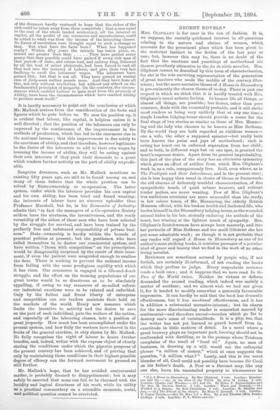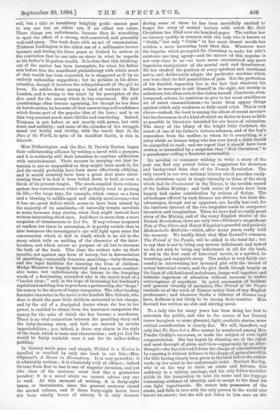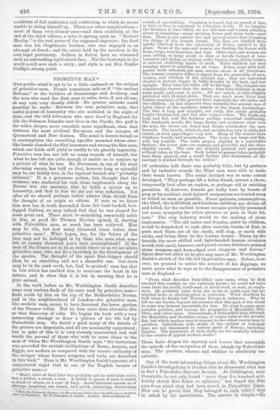RECENT NOVELS.*
OLiremearr is for once in the van of fashion. It is, we suppose, the recently quickened interest in all questions relating to the nature and claims of women, which accounts for the prominent place which has been given to the maternal instinct in the fiction of the last year or two ; but, however this may be, there is no doubt of the fact that the emotions and yearnings of motherhood are themes peculiarly attractive to the fin de siecle novelist. Mrs. Oliphant cannot be described by this term of characterisation, for she is the sole surviving representative of the generation of great masters who made the middle of the century illus- trious ; but the mere narrative theme of A House in Bloomsbury is pre-eminently the chosen theme of to-day. There is just one respect in which we think that it is hardly treated with Mrs. Oliphant's usual artistic feeling. In human life all things, or almost all things, are possible; but fiction, other than pure romance, deals with the reasonably probable, and it will strike most readers as being very unlikely that at any one time a single London lodging-house should provide a scene for the final stage of two stories so similar as those of Mrs. Manner- ing and the lady who chooses to be known as Miss Bethune. By the world they are both regarded as childless women— one a wife, the other a supposed spinster—but really both have known the pains and joys of motherhood; each is eating her heart out in enforced separation from. her child ; and to both, in different ways but on one spot, is granted the heart's supreme desire. Apart from its general improbability, this part of the plan of the story has an obtrusive symmetry which gives an effect of artifice from which Mrs. Oliphesit's work is, as a rule, conspicuously free. Still, even where, as in The Prodigals and their Inheritance, and in the present story, she is less happy than usual in choice of theme or framework, the old charms of delicately truthful characterisation, of fine sympathetic touch, of quiet urbane humour, and reticent tender pathos, are never wanting. Few of Mrs. Oliphant's less ambitious creations are more successful than the study, in low colour tones, of Mr. Mannering, the elderly British Museum official, with his broken health and, darkened life, who buries himself in the Bloomsbury lodging-house, as the wounded animal hides in his lair, stoically enduriag the solitude of the heart, but wincing at the lightest touch of sympathy. Mrs. Oliphant's Scotchwomen have always been masterly, and into her portraits of Miss Bethune and her maid Gilchrist she has put some admirable work ; so though it is not probable that any reader will regard A House in Bloomsbury as one of its author's most striking books, it contains passages of a peculiar kind of grace and beauty that we find in the work of no other living novelist.
Reviewers are sometimes accused by people who, if not foolish, are certainly ill-informed, of not reading the books which they profess to judge. Every respectable reviewer reads a book once ; and it happens that we have read In the Face of the World twice. Neither its virtues or defects demanded the second reading, which indeed was mainly a matter of accident; and we almost wish we had not given it, for it tended to modify somewhat a generally favourable impression. It can hardly be said that the book has dramatic effectiveness, but it has emotional effectiveness, and it has in addition a substantial narrative-interest ; but its charm for the more discriminating reader is somewhat marred by sentimental—and therefore unreal—touches which go far to destroy one's sense of verisimilitude. It is a pity, too, that the writer has not yet learned to guard herself from in- exactitude in little matters of detail. In a novel where a great brewery plays an important part, brewing should not be confounded with distilling, as in the passage where Tristram complains of the smell of "fusel oil." Again, no man of business, in drawing up a will, would use the colloquial phrase "a million of money," which at once suggests the question, "A million what ? " Lastly, and this is the worst blunder of all, Cecil could not poseibly have become Sir Cecil on his father's death. A Peer or a Baronet may, like any one else, leave his unentailed property to whomsoever he • (1.) A HMO in Elocansburv, By Mrs Oliphant. a vols. London : Mitchin- son and On.—(2.) In the Foca of the World. By Alan lit Anbyn. 2 vols. London: Matto and Who:1118.-0 ) Led On. By Helen F. Hetherington and the Rev. 11. Darwin Burton. 3 vole. London : Ward and Downey.—{4.) Wedded to a Genius. By Neil Christison. 2 vol.. London: R. Bentley and Son.—(3.) The Friend of the People. By Mary O. Rowsell. 3 vols. London : T. Fieher Unwin.—(6.) No Hero but a Mau. By Amnia Thomas (dra. render Cadlip). 3 vols. London: F. V. White and Co. will, but a title or hereditary knightly prefix cannot pass to any one but an eldest son, if an eldest son exists. These things are unfortunate, because they do something to spoil the effect of a strong, well-conceived, and generally well-told story. The book deals with an act of renunciation. Tristram Lushington is the eldest 8011 of a millionaire brewer baronet, and during his three years at Oxford he arrives at the conviction that he can take no share in what he regards as his father's ill-gotten wealth. It is clear that this thinking- out of the matter has been incomplete, for when his father sets before him the munificent philanthropy with which much of that wealth has been expended, he is staggered as if by an entirely unfamiliar suggestion ; but he persists in his deter- mination, though it involves the relinquishment of the girl he loves. He settles down among a band of workers in East London, and is wrung to the heart by his perception of the dire need for the money which he has renounced. His self- questionings often become agonising, for though he has done an heroic action, he has none of that unswerving self-confidence which forms part of the popular idea of the hero; and is on that very account much more lifelike and convincing. Indeed, Tristram is put before us not merely with power, but with truth and subtlety; and some of the episodes of his struggle stand out boldly and vividly, with the result that In the Face of the World, in spite of its manifest faults, is rich in interest.
Miss Hetherington and the Rev. II. Darwin Burton began their colloborating alliance by writing a novel with a purpose, and it is evidently still their intention to combine edification with entertainment. Their success in carrying out that in- tention is not so unqualified as they might have made it, for Led On would probably have been more effectively edifying, and it would certainly have been a great deal more enter- taining than it is, had it been boiled down to half, or even a third, of its present length. The much-assailed three-volume system has conveniences which will probably tend to prolong Ito life,—the large type, for example, which comes as a boon and a blessing to middle-aged and elderly novel-lovers,—but it has one great defect which seems to have been missed by the majority of its assailants,—it naturally tempts novelists to write tiresome long stories, when they might instead have written interesting short ones. And there is more than a mere suspicion of tiresomeness in Led On. If any volume is opened at random ten times in succession, it is pretty certain that in nine instances the investigator's eye will light upon some fiat conversation which is dull in itself, which is no aid to the story, which tells us nothing of the character of the inter- locutors, and which serves no purpose at all but to increase the bulk of the book. This time the writers take up their parable, not against any form of heresy, but in denunciation of gambling,—especially feminine gambling,—baby-farming, and the legal facilities for insuring the lives of children. Madge Manners is happily married and has a most comfort- able home, but unfortunately she listens to the tempting words of a fascinating scoundrel who is the secret head of a "bucket shop ; " and, in the hope of increasing her husband's capital and enabling him to purchase a partnership, she "drops" his money in the shares of bogus companies. The other leading feminine character in the novel is the fiendish Mrs. Schenk, who does to death the poor little children entrusted to her charge, and by the aid of a dissipated doctor whom she has in her power, is enabled to obtain from the insurance companies the money for the sake of which she has become a murderess. There is no vital connection between the gambling story and the baby-farming story, and both are marred by certain improbabilities ; nor, indeed, is there any charm in the style of the book, which is tame and characterless ; and yet Led On would be fairly readable were it not for its talkee-talkee padding.
In literary merit pure and simple, Wedded to a Genius is equalled or excelled by only one book in our list,—Mrs. Oliphant's A House in Bloomsbury. It is very powerful ; it is admirably written; it is absolutely void of offence ; indeed its tone from first to last is one of singular elevation, and yet (the close of the sentence must look like a gratuitous paradox) it is a novel which we cannot advise any one to read. At this moment of writing, it is forty-eight hours, or thereabouts, since the present reviewer closed the second volume, and if those forty-eight hours have not been wholly hours of misery, it is only because during some of them he has been mercifully enabled to forget the story of mental torture with which Mr. Neil Chrietison has filled over six hundred pages. The author has no literary quality in common with the lady who is known as " Ouida," but only " Oujda " in her most dismal moods has written a more harrowing book than this. Whatever were the impulse which prompted Dr. Courtney to make his wife's existence one long agony—and the nature of this impulse is not very clear to us—we have never encountered any more ingenious manipulator of the mental rack and thumbscrew. He has studied the position of every spiritual and emotional nerve, and deliberately adopts the particular machine which can best elicit its full possibilities of pain. But the perfection of his fiendish ingenuity lies in the fact that whatever his action, he manages to put himself in the right, not merely to onlookers, but often even to the victim herself. Courteous, even- tempered, urbane, he contrives to give to his worst cruelties an air of sweet reasonableness,—to make them appear things against which only weakness or folly could rebel. This is very clever—indeed, the book is among the ablest of recent novels— but its cleverness is of a kind of which we desire to have as little as possible in literature intended for our hours of relaxation. The story of the idiocy of the bright little Cuthbert, the result of one of his father's torture-schemes, and of the boy's separation from the mother, to whom he is everything, is a story which no human being who has ever loved a child should be compelled to read ; and our regret that it should have been written is intensified by a suspicion that "Neil Christison " is a pseudonym veiling a feminine personality.
No novelist or romancer wishing to write a story of the past can find any period richer in suggestion for structure and background than that of the French Revolution. The only record in our own national history which provides ready- made situations equal in tragic intensity to those of the story which had its denouement in the Terror, is the terrible record of the Indian Mutiny ; and both series of events have been largely laid under contribution by writers of fiction. The advantages offered by such themes are obvious, but their dis- advantages, though not so apparent, are hardly less real, for the intrinsic interest of the two tragedies tends to overpower invention and imagination. Thus, we have had no really great story of the Mutiny, and of the many English stories of the French Revolution, there are only two—Dickens's magnificent Tale of Two Cities and Henry Kingsley's graceful and pathetic Mademoiselle Mathilde—whieh, after many years, really hold the memory. We hardly think that Miss Rowsell's romance, The Friend of the People, will be added to the brief list ; but to say that is not to bring any serious indictment, and indeed we do not wish to bring any indictment at all, for the book, if not in the first rank of historical novels, is a spirited, in- teresting, and enjoyable story. The author is very fairly suc- cessful in intertwining her invented plot with the thread of actual historical events, and the plot itself, though largely on the lines ef old-fashioned melodrama, hangs -well together, and sustains eagerness of attention without recourse to undue extravagance of expedient. In quick succession of incident and general vivacity of narrative, The Friend of the People reminds us of the work of Dumas rather than of any English predecessor ; and whatever faults a follower of Dumas may have, dullness is not likely to be among their number. Miss Rowsell has written an able and stirring novel.
To a lady who for many years has been doing her best to entertain the public, and who in the course of her literary career has given us some pleasant, light, readable stories, some critical consideration is clearly due. We will, therefore, say only that No Hero but a Man cannot be numbered among Mrs. Pender Cudlip's successes, or made the subject of even tepid congratulation. She has begun by choosing one of the oldest and most decrepit of plots, and then—apparently by an after- thought—she has relieved it from the charge of conventionality by exposing it without defence to the charge of gross absurdity, the title having clearly been given to the book before the author made up her mind to the unfortunate twist. Herbert Harlby, who is on his way to claim an estate and fortune, dies suddenly in a railway carriage, and his only fellow-traveller yields to the temptation to take his name and the luggage containing evidence of identity, and to assign to the dead his own light impedimenta. He enters into possession of the estate, and falls in love with the only person in the world who knows his secret ; but she will not listen to him save on the condition of full confession and restitution, to which he seems unable to string himself up. There are other complications— most of them very clumsy ones—and then suddenly, at the end of the third volume, a mine is sprung upon us. "Herbert Harlby " is the real name of the supposed impostor ; the dead man was his illegitimate brother, who was engaged in an attempt at fraud ; and the estate held by the survivor is his own legal patrimony. Seldom in fiction have we witnessed such an astounding right-about-face. Not the best style in the world could save such a story; and style is not Mrs. Fender Cridlip's strong point.








































 Previous page
Previous page